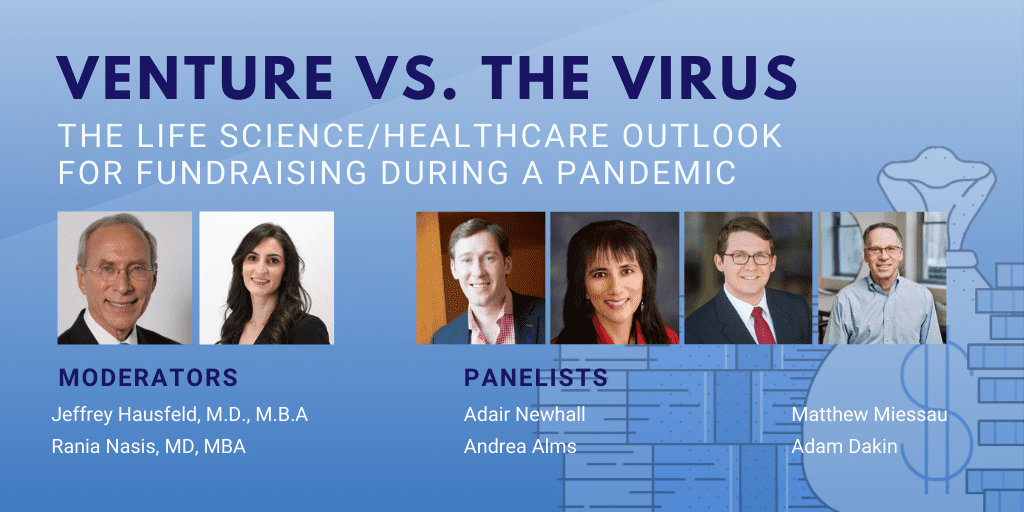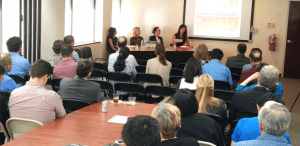
Four Leading VC’s Give Advice on Raising Capital During COVID-19
Six Key Takeaways for Entrepreneurs and Startups on Fundraising and How Investors View the Post-Coronavirus Landscape
Over 200 entrepreneurs, startup company executives and those with aspirations of starting a BioHealth company turned in for a live, virtual panel discussion to learn about how COVID-19 is impacting access to the capital every company needs to succeed.
Panelists included notable investors such as Andrea Alms, Co-Fund Manager at BioHealth Capital; Adam Dakin, Managing Director at DreamIT HealthTech; Matthew Miessau, Associate at Epidarex Capital; and Adair Newhall, Principal at Greenspring Associates.
The program, “Venture Versus the Virus”, was organized by The Society of Physician Entrepreneurs (SoPE), and produced in collaboration with BioBuzz. The program focused on venture capital (VC) key opinion leaders (KOLs) with ties to the BioHealth Capital Region (BHCR) and delivered some nuanced insights for entrepreneurs, while also elucidating larger VC market themes that have emerged during COVID-19.
Dr. Jeffrey Hausfeld, Chairman and Co-Founder of SoPE and the Chief Medical Officer and Chairman of the Board at Frederick, Maryland’s emerging biosimilars company BioFactura co-moderated the event along with Dr. Rania Nasis, Director at SoPE and New York Tristate Chapter Co-Leader and the CEO of Starlings, a startup advisory company.
Here are some of the key takeaways. For the full conversation, you can watch the complete webinar recording here:
Deals Are Still Getting Done But Investors Are Wary
The panelists had slightly different takes on how VC firms and investors are responding to the COVID-19 crisis. All agreed that there is still money out there for startups and entrepreneurs, however, many investors have hit a “pause” on investing as they wait to see the ripple effect the pandemic has on various markets.
Adair Newhall noted that investors are waiting for the public downturn to hit private markets, which could take three to six months and drop private values between 20-40%. The good news, according to Newhall: Biotech has seen less disruption than other sectors because of its direct involvement in working on COVID-19 projects.
Miessau, Alms and Durkin all expressed a positive outlook for the life science sector and that it was business as usual at their firms for now.
Series B/C Rounds Might See More Significant Negative Impacts Due To COVID-19
Durkin noted that life science companies closer to commercialization seeking Series B/C rounds might be more negatively impacted by COVID-19 than early stage companies that are seeking funding based on promise and projections. The panelist believed that companies close to commercializing a product and clinical-stage organizations, where supply chain and social distancing could disrupt ongoing trials and prevent trials from starting, could be impacted more seriously than companies seeking pre-seed, seed round and Series A funding.
VCs Are Dubious Of “COVID-19 Contortionists” And The Telemedicine “Gold Rush”
The panelists cautioned startups and emerging companies against being a “COVID-19 Contortionist” that “invents COVID-19 use cases” and moves away from its core positioning and business model. VCs are not receptive to companies that pivot to a COVID-19 focus if what they’re doing lacks substance, differentiation and potential for success.
In addition, the panel agreed that the pandemic has removed barriers for the expansion of telemedicine in healthcare.
Durkin likened the current telemedicine environment to a “gold rush” with digital health devices and technologies flooding the market. He noted remote patient monitoring as a market that is flooded with products and ideas. However, unless you have a truly differentiated product that has a high upside and an existing track record, VCs will not be receptive to “another telemedicine” pitch coming to their inbox.
Half of VC’s May Invest In A Company Even If They Never Met The CEO Or Executive Team In Person
The panelists agreed that the funding world has always been about interpersonal relationships, pressing the flesh and face-to-face dialog. VCs want to meet a startup founder or CEO in person, sit down for dinner and get to know them and their leadership team personally before investing in them.
Now, face-to-face meetings are rare, and, like other sectors, meetings and interactions have gone virtual.
Durkin shared that he had informally polled other VCs he knew and shared that about 50% said they would invest in a company without actually meeting its leaders in person. The panel was split in a similar fashion, all noting that there were circumstances where they had, or would, do a deal without an in person meeting happening first.
Deals now need to get done by virtual means, which goes against VC reliance on face-to-face assessments of leadership teams. That said, there seems to be a willingness among VCs to adapt so that they don’t, as Miessau stated, “…miss a deal.”
Now Is A Great Time To Build A Network That Can “Lift You Up”
There are still deals to be had, but the VC market has certainly slowed some and many investors are now at home, spending much of their time working and connecting with people online.
Newhall stated that now is the time to really build your network foundation and gather the support of KOLs so you’re ready when that funding opportunity arises. Moderator Dr. Rania Nasis noted that she’s hearing and seeing that KOLs and other important networking connections are more open than ever to communicating and perhaps even meeting virtually. Multiple panelists suggested taking time to focus on working LinkedIn to build this networking foundation during the pandemic.
Building a stronger network could be pivotal to funding success, as generating “warm introductions” to VC firms and investors from this network will lead to greater fundraising opportunities and a higher rate of success. And once that warm intro gets you in the door, the KOLs can be your allies in advocating for your company, its technology or product.
Despite The Pandemic, What VCs Look For Hasn’t Changed
Yes, COVID-19 has changed so many facets of the life science business. Medical device sales reps no longer have access to hospitals and doctors; CRO work is being disrupted by supply chain issues and other factors; emerging companies are shedding staff and trying to extend their cash runways the recommended 9-12 months; and the medicare and medicaid payer landscape is in flux.
That said, what VCs are looking for in potential investment targets is largely unchanged. VC firms and individual investors want to see great IP, a big market, strong value upside, a product that has commercial promise and a leader and leadership team that is coachable (or has the self-awareness and humility to step aside for a more experienced leader). Investors also still look for leaders that have experience building companies, can uplift and empower a team and have a deep network of KOL advocates.
The how might be changing in the VC market, but the what for VCs and investors is as it’s always been.
- About the Author
- Latest Posts
Steve brings nearly twenty years of experience in marketing and content creation to the WorkForce Genetics team. He loves writing engaging content and working with partners, companies, and individuals to share their unique stories and showcase their work. Steve holds a BA in English from Providence College and an MA in American Literature from Montclair State University. He lives in Frederick, Maryland with his wife, two sons, and the family dog.




